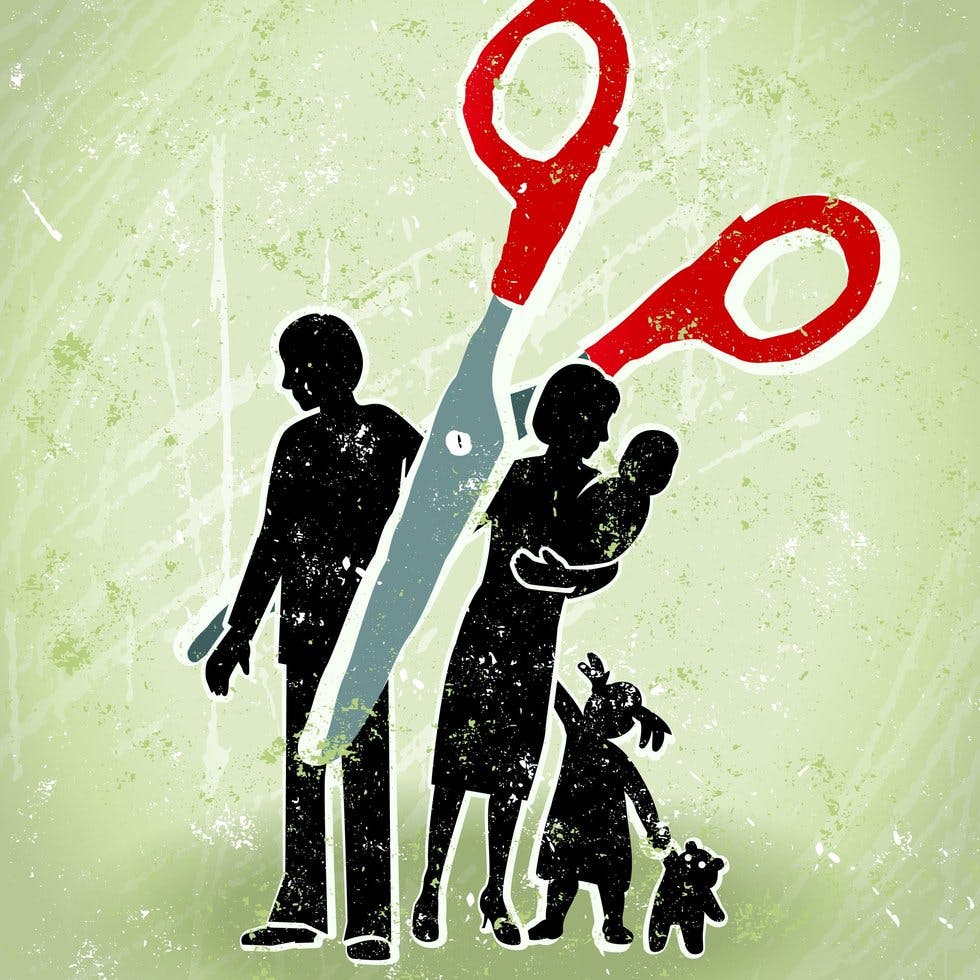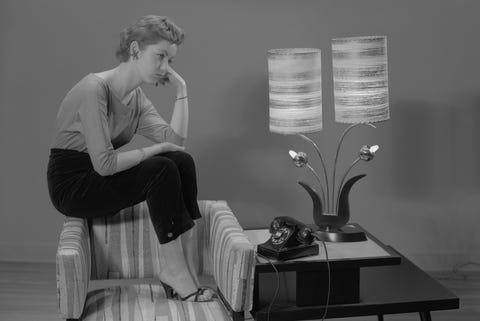
It’s difficult to nail those ‘peace on earth’ vibes when your mum and dad have suddenly decided that they hate each other’s guts. Here, life coach Sara Davison offers her advice on how to choose between your parents at Christmas.
My parents officially separated when I was 26 years old, and, for a while, I found myself perennially haunted by the Ghosts of Christmas. You know the ones I mean: the first visits quite early on in the year, when your mum asks casually – a little too casually – what your yuletide plans are. She catches you off guard, and you almost answer without thinking about it; you almost say, “I’m coming home, obviously – where else would I go?”
Then you remember that home isn’t the same as it used to be. Mum’s moved into her own little house, dad is living with his new partner, and to make a decision without thinking very carefully about the repercussions feels overwhelmingly like the familial equivalent of voting to Brexit; a horrible mess that you can’t talk your way out of, no matter how hard you try.
“Remember?” whispers the Ghost of Christmas Past, suddenly at your ear. “Remember when you could just go home for presents and a sloppy turkey roast?”
The Ghost of Christmas Past likes to state the obvious, I’ve found. And it also likes to shuffle through my memories for the rosiest-tinted recollections it can get its mitts on, playing them over and over in my head whenever I’m feeling emotionally fragile – which, at this time of year, is pretty much my constant state of being. All it takes is a soaring rendition of Judy Garland’s Have Yourself a Merry Little Christmas on the radio, or prolonged exposure to sappy Christmas adverts.
Over the years, though, things have gotten easier. A lot easier. And that is almost entirely down to my wonderful parents. Together, we’ve come to a brilliant arrangement that suits us all: my sister and I spend Christmas (complete with family games, festive joy, presents under the tree, letters to Santa Claus and a big gut-busting lunch) with my mum. Then, on New Year’s Eve, we do Christmas all over again (minus the letters to Santa) with dad and his new partner. Everyone is happy, everyone has a lovely time, everyone feels good about themselves and the year ahead. Nobody feels guilty, or sad, or anxious.
In short, I’m very lucky: I have parents who consistently put me and my sister first, and their own feelings about their divorce second. But what about all those ACOD (Adult Children of Divorce) who don’t have things as easy as we do? With this thought in mind, I reached out to Sara Davison –esteemed divorce coach and author of The Split – 30 days from Breakup to Breakthrough – for her advice on the matter.

Be sensitive to your parents’ feelings. It will be hard for them too, even if they are putting on a brave face for you.
“Your parents breakup can hit home especially hard over the festive season as Christmas is traditionally a family time,” says Sara. “You will have to navigate a minefield of difficult decisions including who you visit for Christmas lunch, how you avoid upsetting either of them and whether spending time with new partners is going to cause arguments.
“A few days ago Megan came to see me to ask my advice about how to handle her parents divorce and the effect it was having on her. Her Dad had left her Mum six months ago and had recently met a new woman and they had invited Megan to have Christmas lunch with them. Megan felt sorry for her Mum as she would be on her own and had always made such a fuss about having the family around over the holidays. It was going to be a huge change for her. Megan also knew that her Mum was finding it really hard that her Dad had moved on so quickly and met someone else, not helped by the fact that she was a lot younger too.
“It may surprise you that the older you are when your parents breakup the harder it can be to adjust and the bigger the shock because it’s all you’ve ever known. This is because our parents are often seen as our rock and no matter how well you get on with them as an adult they will always represent “home” and “security”. They embody all your childhood memories and have been instrumental as a team in bringing you up and forming your values and opinions. So if they decide to split up it can be a difficult adjustment.
“Megan was definitely finding it really hard and didn’t want to upset either of their festive plans. She felt happy for her Dad for moving on as she had known he was unhappy for many years. However she was also devastated for her Mum especially as this would be her first Christmas since the family home was sold. It was also hard for Megan as events like selling the family home can have a big impact on adult children too. It feels like you are losing a part of your history. Sometimes adults find change harder to adjust to than children who are often more open and flexible.
“Obviously you know your parents best and can anticipate their reactions better than anyone. So it’s important to trust your instinct and make the right decisions for your personal situation.”
Sara Davison’s top 10 tips for coping with your parents’ divorce over Christmas:
- Work out what YOU want to do over Christmas first. Find a plan that you are happy with so you know what would be ideal but be open to being flexible.
- Have good communication about plans for Christmas with each parent. Let them know what you would like to do and listen to what they have to say.
- Be fair. If they both want you to come for Christmas lunch suggest that this year you do it with one parents and alternate for the next year. If they live close enough you can always do Boxing Day lunch with the other parent instead.
- To diffuse potential arguments do make it clear that you are finding this hard to. Sometimes parents forget their breakup has a ripple effect on their adult kids too.
- If you are worried that one or both parents are struggling find ways to make it easier for them by contacting friends to alert them and to ask if they could help out over Christmas too.
- Avoid bad mouthing one parent to another as this will only inflame the situation and not make it better.
- Be sensitive to your parents’ feelings. It will be hard for them too, even if they are putting on a brave face for you.
- If one parent has a new partner, and this is hard for the other parent, one way to keep the peace is to consider spending a little less time with them for this first Christmas. As things settle and your parents move on with their lives you can spend more time with new partners.
- Focus on the fact that this can be a good opportunity for your parents to find more happiness. If they weren’t happy in the marriage then it can be the best thing for them.
- Remember you can’t please everyone all the time. Do your best and make sure it works for you too.
Above all else, don’t compare your own relationship to that of your parents. Some adult children of divorce will find themselves questioning their own relationships or shunning commitment after their parents’ divorce – but you shouldn’t cultivate a cynicism about love. Instead, use it as a learning experience, analyse what went wrong between your mum and dad, and apply that knowledge to your own relationships to avoid the same pitfalls.

Remember you can’t please everyone all the time. Do your best and make sure it works for you too.
“Sometimes couples apart find a new sense of freedom and a jest for life that they didn’t have together,” adds Sara. “You may find that seeing your parents happier makes up for any sadness about their divorce.
“The New Year is the perfect time for a fresh start and a divorce gives both your parents a chance to redesign their lives just the way they want to. It’s interesting that the marriage rate for ‘silver splitters’ has been increasing in recent years so don’t be surprised to find your parents moving on with new partners and having a second bite at the cherry!”












